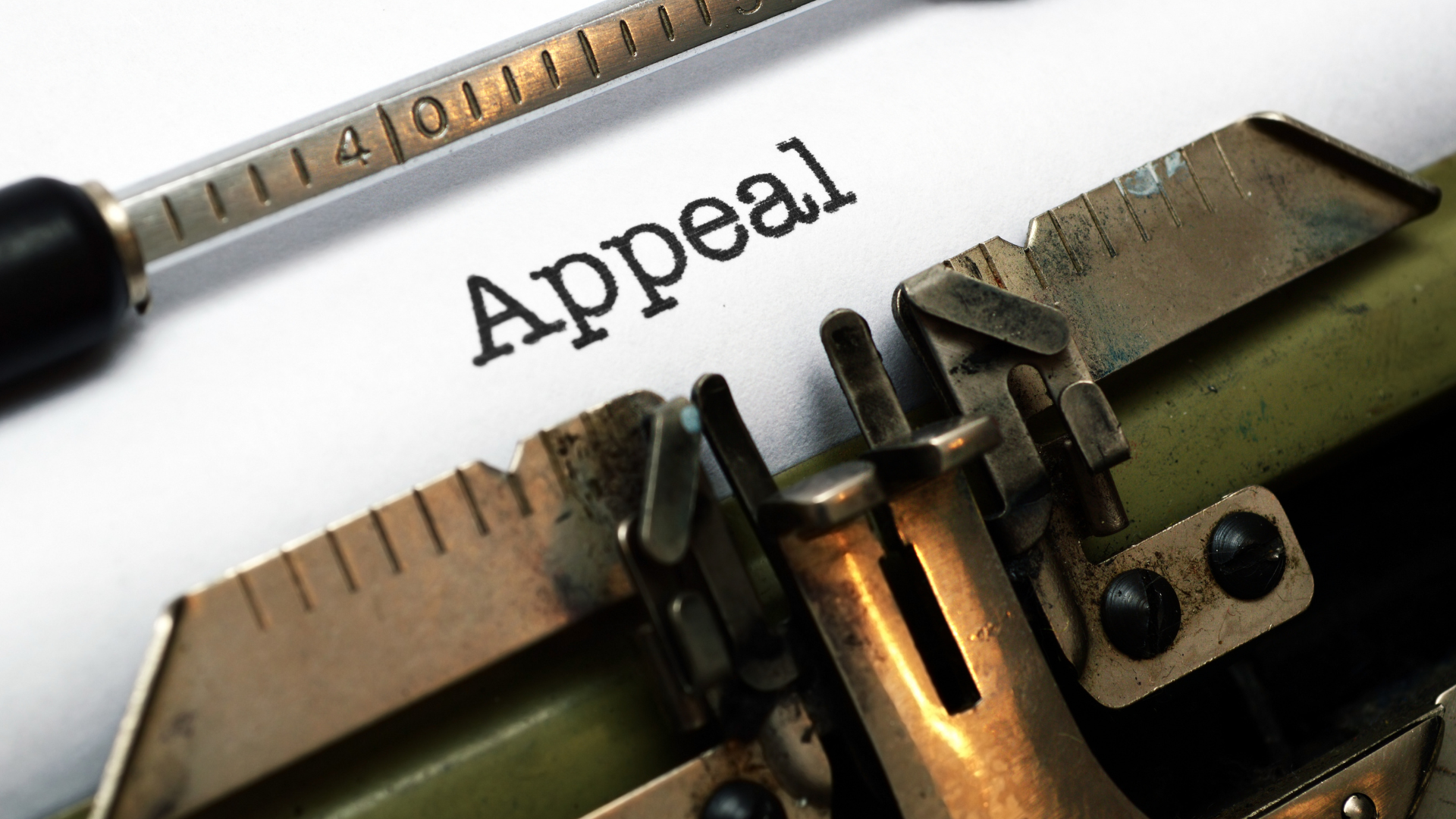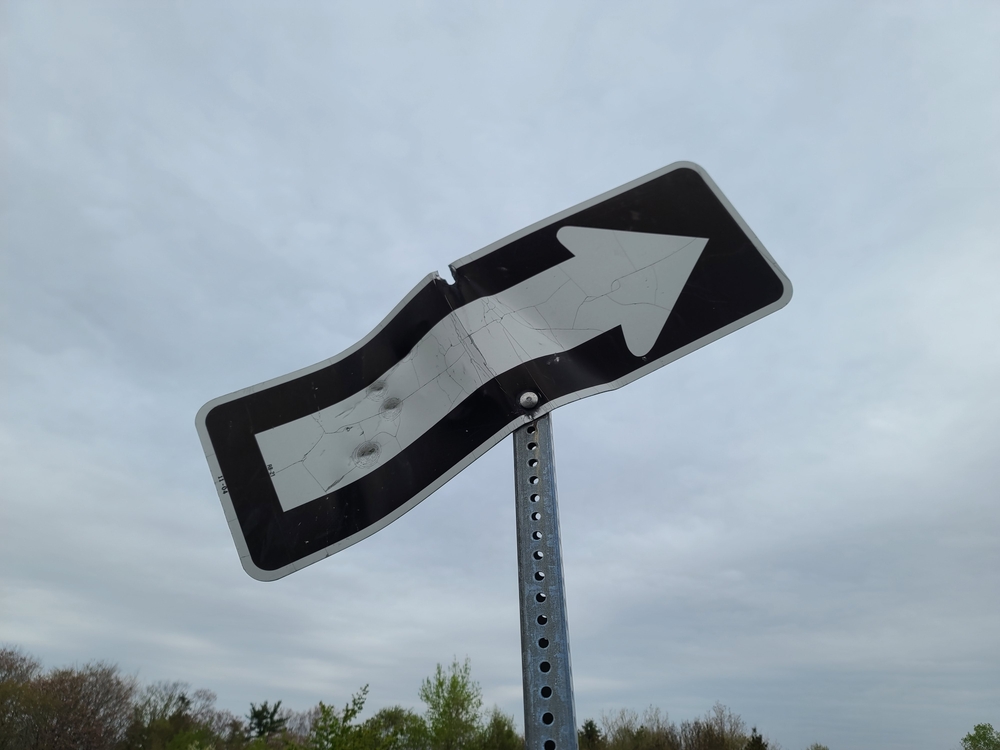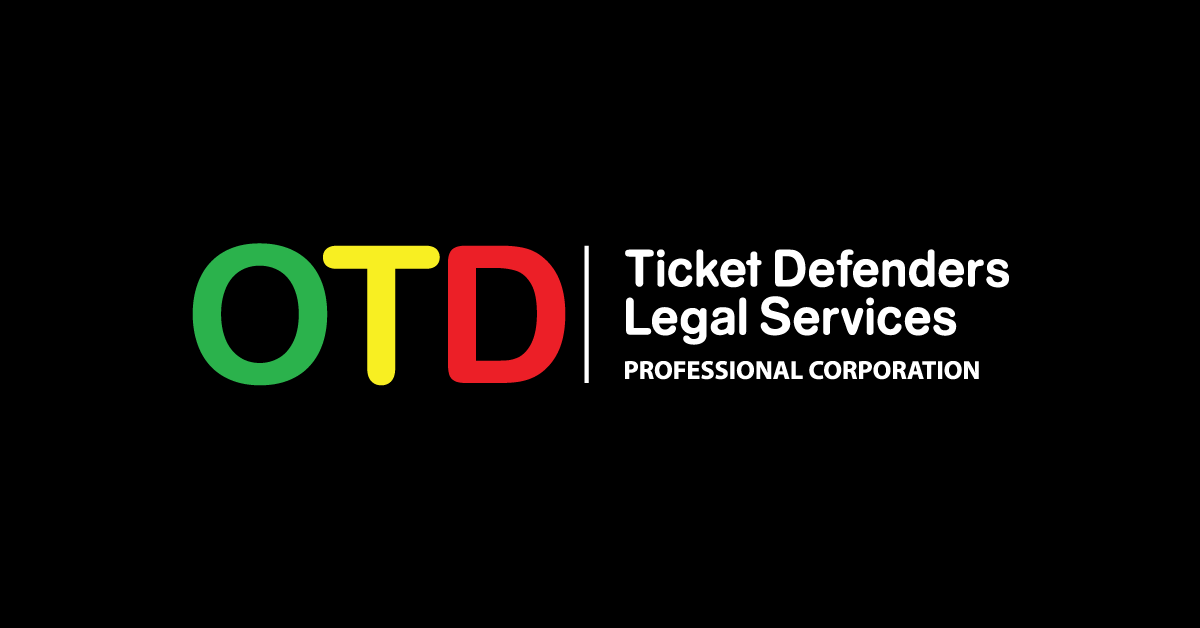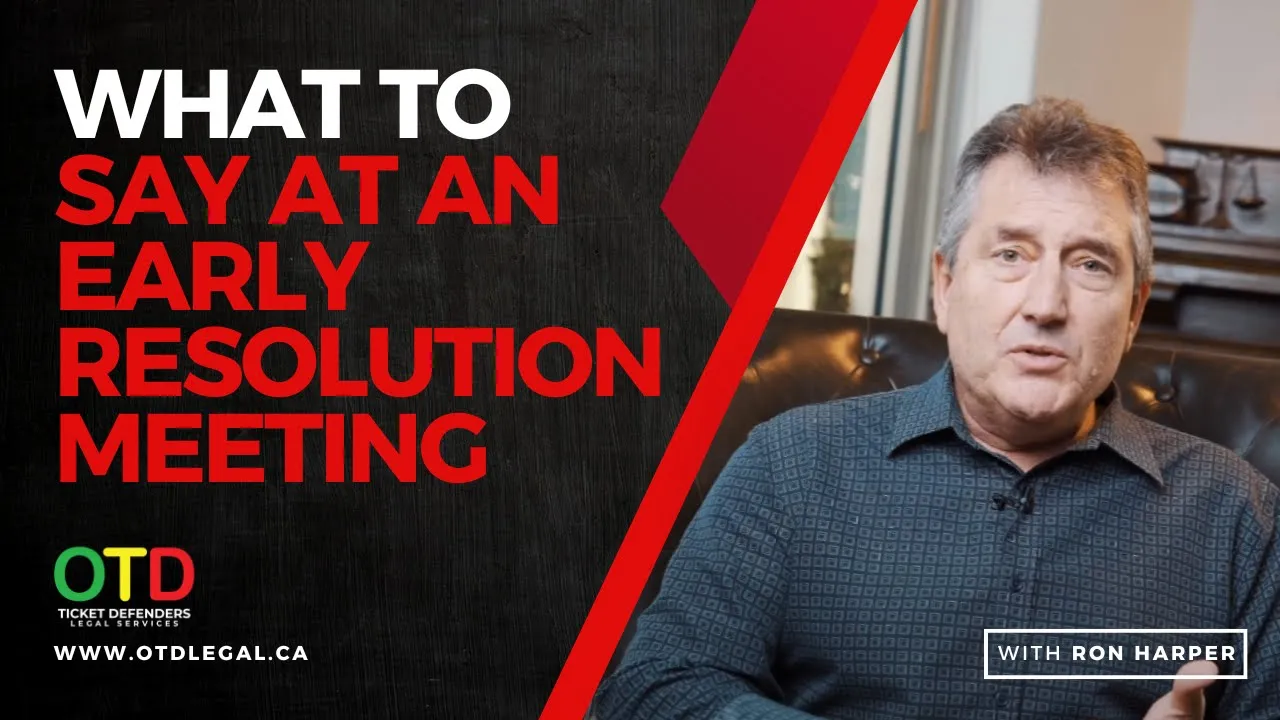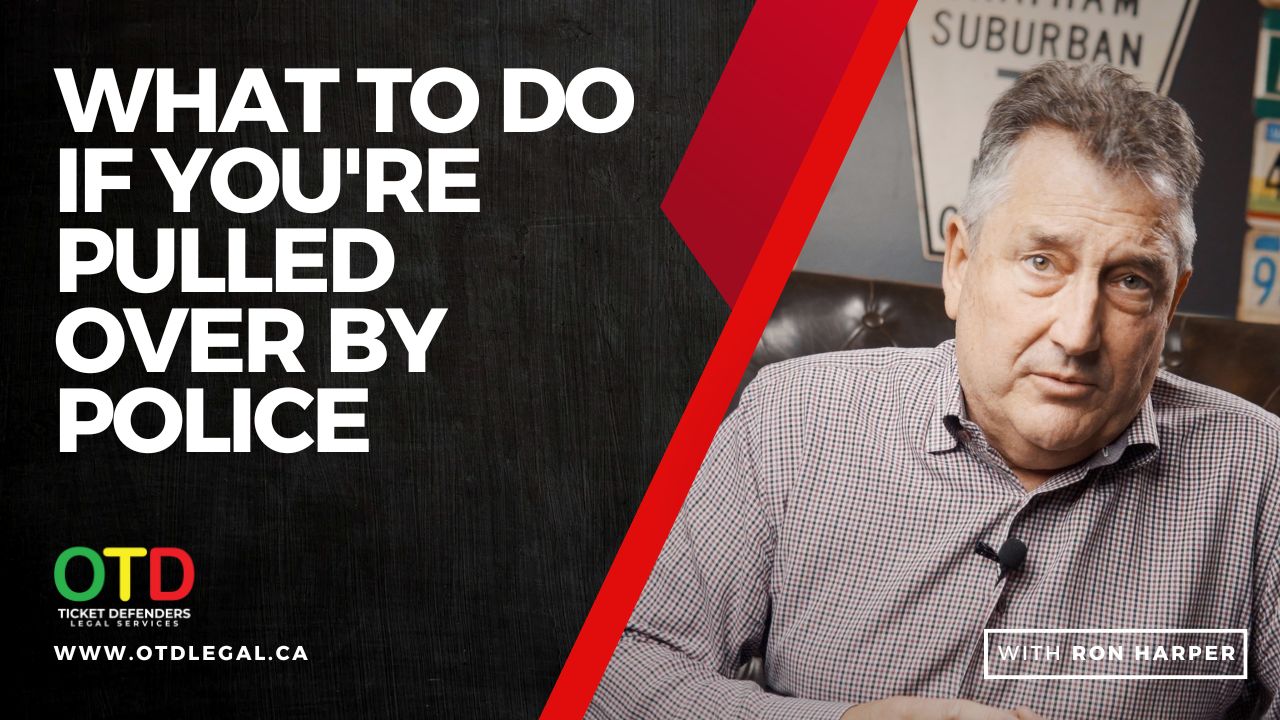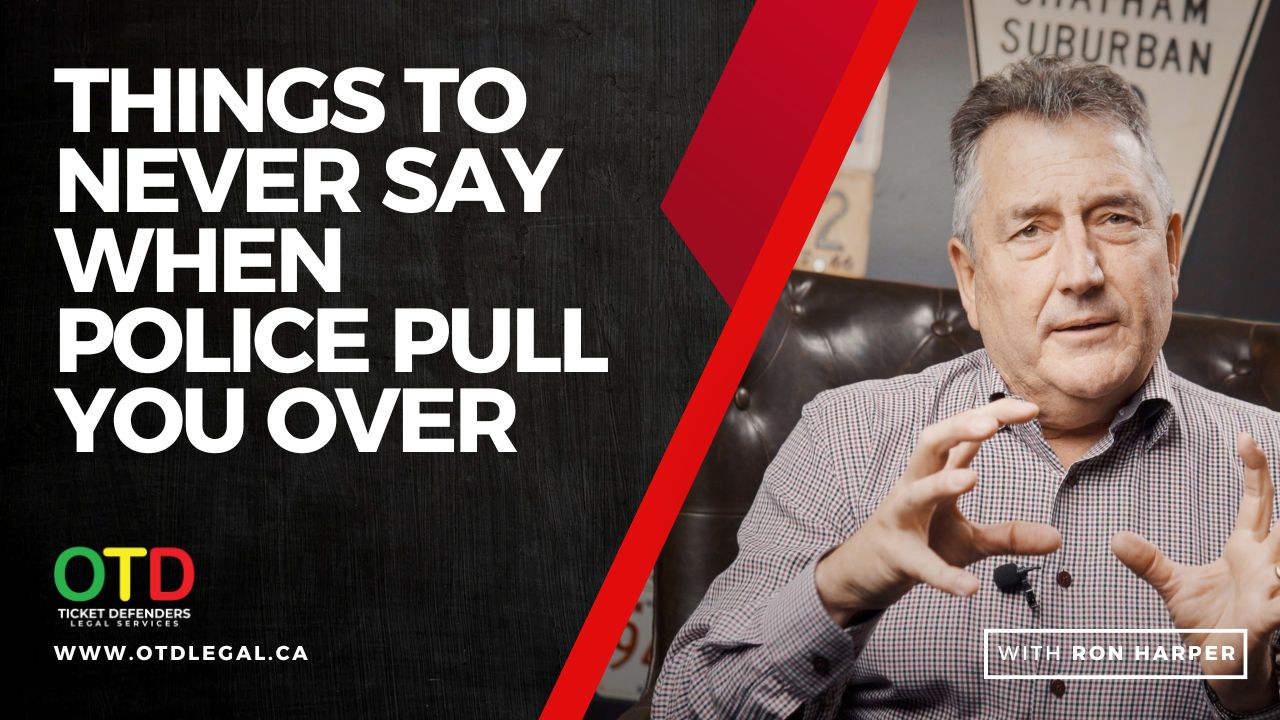If you’ve been convicted of a traffic offence you believe was unfair, you may have the right to appeal, but timing and legal grounds are critical.
- You only have 30 days from the conviction date to file an appeal. This deadline is strict and non-negotiable.
- Appeals aren’t about disagreeing with the outcome, they only succeed if there was a legal or procedural error during your case.
- Common reasons appeals succeed include judicial errors, misinterpretation of the law, or issues with how evidence was handled.
- Appeals usually fail when drivers try to challenge the facts of the case or miss key deadlines.
- Having legal professionals like OTD Legal, who specialize in traffic ticket appeals, can significantly increase your chances of success.
Think your conviction was a mistake? Read the full article to find out how to appeal properly, and why experienced legal help makes all the difference.
Got a Traffic Ticket You Think is Unfair? Let’s Talk About Your Options
That sinking feeling when you get convicted of a traffic ticket and you know something wasn’t right. Maybe the officer’s testimony didn’t add up. Maybe you weren’t given a fair chance to present your evidence. Or maybe the judge seemed to ignore crucial details that could’ve changed everything.
Sound familiar? You’re not stuck with an unfair conviction. In Ontario, you have the right to appeal your traffic ticket conviction – but there’s a catch. It’s not as simple as saying “I disagree” and getting a do-over. Appeals are about identifying specific legal mistakes that happened during your original trial.
Here’s what you’ll learn in this guide: the four most common legal errors that can win an appeal, the critical mistakes that doom most appeals to failure, and the exact steps you need to take within that crucial 30-day deadline. We’ll also break down when it makes sense to fight and when OTD Legal can help you navigate this complex process.
Because honestly? The difference between a successful appeal and a permanent mark on your record often comes down to understanding what you’re actually fighting for.
Understanding the Appeal Process
What exactly is a Traffic Ticket Appeal?
Let’s clear this up right away. A traffic ticket appeal isn’t a new trial where you get to re-argue your case from scratch. It’s your chance to tell a higher court why the original judge made a legal mistake in convicting you.
Think of it like this: you’re not saying “I didn’t do it.” You’re saying “The judge got the law wrong” or “I wasn’t treated fairly under the legal process.” That’s a crucial distinction that many people miss.
Why Bother With an Appeal?
The stakes are real. A traffic conviction doesn’t just mean paying a fine and moving on. You’re looking at:
- Demerit points that could suspend your licence
- Insurance premium increases that can cost thousands over time
- A permanent mark on your driving record
- Potential employment consequences if you drive professionally
- Possible driver’s licence suspension
According to Ontario’s demerit point system, accumulating too many points can lead to licence suspension. For new drivers, the threshold is even lower.
The 30-Day Deadline: Why Time is Everything
Here’s the hard truth: you have exactly 30 calendar days from your conviction date to file your Notice of Appeal. Miss this deadline by even one day, and you’re essentially out of luck. While it’s possible to apply for an extension, these are rarely granted unless you have exceptional circumstances.
This isn’t like other legal deadlines that have some wiggle room. The Provincial Offences Act is strict about this timeline, and courts don’t show much sympathy for “I didn’t know” or “I was busy.” If you are late filing an appeal, the court will simply reject your application.
How Appeals Differ From Trials
Appeals aren’t do-overs. While trials focus on determining what actually happened, appeals examine whether the law was applied correctly. You can’t introduce new evidence easily, and you can’t re-argue the facts. Appeal courts assume the trial judge got the facts right unless there’s compelling evidence otherwise.
This fundamental difference shapes everything about how appeals work and why many fail. Understanding this distinction is crucial before you decide whether to appeal.
Grounds for Appeal: Why Some Appeals Succeed
Legal Errors Made by the Trial Court
This is your best shot at a successful appeal. When judges get the law wrong, appellate courts take notice. Common legal errors include:
Misinterpreting the Provincial Offences Act or Highway Traffic Act: Sometimes judges apply the wrong legal standard or misunderstand what the law actually requires for a conviction. For example, if you were convicted of speeding based on visual estimation alone, but the judge failed to consider whether proper foundation was laid for that type of evidence.
Incorrect Legal Procedures: Did the prosecutor fail to prove an essential element of the offence? Was evidence admitted that should have been excluded? These procedural missteps can be grounds for overturning a conviction.
Improper Consideration of Evidence: If the judge gave weight to evidence that shouldn’t have mattered or ignored crucial evidence that supported your defence, this could be a reversible error.
Violations of Procedural Fairness
Your right to a fair hearing is fundamental. Violations that can win appeals include:
Denial of Disclosure: You have the right to see the evidence against you before trial. As outlined in OTD Legal’s comprehensive guide to fighting tickets in court, if you weren’t provided with officer notes, witness statements, or other relevant documents, this could invalidate your conviction.
Inadequate Opportunity to Present Your Case: Were you rushed through your defence? Prevented from calling witnesses? Not allowed to cross-examine the officer? These procedural violations can be appeal grounds.
Judicial Bias or Improper Conduct: If the judge demonstrated bias, made inappropriate comments, or failed to maintain neutrality, this attacks the fundamental fairness of your trial.
Failure to Give Reasons: Judges must explain their decisions. If you received a conviction without proper reasoning, especially in complex cases, this could be a reversible error.
Improper Admission or Exclusion of Evidence
Evidence issues are technical but powerful appeal grounds:
Hearsay Evidence: If the judge relied on secondhand information without proper legal foundation, this could overturn your conviction.
Relevant Evidence Excluded: Were you prevented from presenting photographs, witness testimony, or evidence that was relevant to your defence?
Chain of Custody Issues: For technical evidence like radar readings, proper procedures must be followed. Gaps in the chain of custody can invalidate key prosecution evidence.
The key to successful appeals based on evidence issues is demonstrating that the error wasn’t just technical – it actually affected the outcome of your case.
Why Many Appeals Fail
Challenging Factual Findings
Here’s where many appeals die. Appellate courts generally won’t second-guess a trial judge’s findings about what actually happened. If your appeal essentially argues “the judge believed the wrong person” or “the officer was lying,” you’re facing an uphill battle.
Appeals courts give substantial deference to trial judges on credibility assessments. They were there, they heard the witnesses, and they made credibility findings. Unless there was no evidence whatsoever to support the judge’s conclusions, these factual findings usually stand.
This is probably the most common misconception about appeals. Disagreeing with the judge’s assessment of who was telling the truth isn’t grounds for appeal – it’s just disagreement.
Attacking Witness Credibility
Similar to factual findings, challenging witness credibility on appeal is extremely difficult. The trial judge observed the witnesses, heard their testimony, and made credibility determinations based on factors appellate courts can’t assess from a written transcript.
Unless there were clear procedural errors in how witness testimony was handled, or the credibility finding was completely unsupported by any evidence, these challenges typically fail.
Missing Filing Deadlines
This kills more potential appeals than any other factor. We can’t stress this enough – the 30-day deadline is absolute. Administrative errors, vacation time, “I didn’t know I could appeal” – none of these excuse missing the deadline.
Even if you have the strongest legal argument in the world, miss that deadline and it’s game over. Extensions are rarely granted, and when they are, you need exceptional circumstances beyond your control.
Don’t let this happen to you. If you’re considering an appeal, act immediately.
Procedural Rules for Filing an Appeal
The Notice of Appeal: Your Official Declaration
This is your formal “I want to appeal” document. The Notice of Appeal must:
- Clearly state what you’re appealing (conviction, sentence, or both)
- Briefly outline your grounds for appeal
- Be filed within 30 days of conviction
- Include proof of transcript request, including payment, if necessary
You can get the form from the court office where your trial took place. Don’t wing it – make sure you complete it properly the first time.
Payment Requirements and Financial Implications
In most cases, you’ll need to pay the original fine before your appeal can proceed. This doesn’t mean you’re admitting guilt – it’s just a procedural requirement. If your appeal succeeds, the fine gets refunded.
However, you may apply to have your demerit points and conviction put on hold during the appeal process. If a Stay is granted, the conviction won’t appear on your driving record while the appeal is active.
Court Transcripts and Documentation
If your ticket was decided after a trial, you’ll likely need trial transcripts. This is the official word-for-word record of what happened at your original hearing. The transcript is crucial because the appeal court needs to see exactly what legal errors occurred.
Transcript costs vary depending on the length of your trial, and they can take weeks or even months to prepare. You must request the transcripts and put down a deposit before filing your appeal documents. Factor this into your timeline and budget.
Service Requirements
For certain types of appeals, you must serve the prosecutor’s office with a copy of your Notice of Appeal before filing it with the court. Make sure you understand the service requirements for your specific case – improper service can derail your appeal before it starts.
The Appeal Factum: Your Written Argument
This is where the rubber meets the road. Your appeal factum is a written legal argument that outlines:
- The specific errors made at trial
- The legal authorities (cases and statutes) supporting your position
- Why these errors require overturning your conviction
Writing an effective factum requires legal expertise and familiarity with appellate court preferences. This isn’t a place to wing it – the quality of your factum often determines your appeal’s success.
Assessing the Chances of Success
Success Rates in Canadian Courts
Let’s be honest about the numbers. While comprehensive appeal success statistics aren’t publicly available for Ontario traffic tickets, general appeal success rates can look daunting. Many appeals fail, not because they lack merit, but because they’re not properly prepared or argued.
But here’s the thing: your chances improve dramatically when you have strong legal grounds, proper preparation, and experienced representation. Appeals aren’t lottery tickets – they’re legal arguments that succeed or fail based on the quality of preparation and advocacy.
The reality is that most successful appeals are based on clear legal errors rather than factual disputes. Courts are much more willing to correct legal mistakes than to second-guess credibility assessments.
Factors That Influence Appeal Outcomes
Several factors significantly influence appeal outcomes:
Strength of Legal Grounds: Appeals based on clear legal errors have much better prospects than those challenging factual findings.
Quality of the Trial Record: A well-documented trial with proper objections and legal arguments provides more ammunition for appeal.
Timeliness and Procedure: Meeting deadlines and following proper procedures seems basic, but many appeals fail on technicalities.
Representation Quality: Experienced legal representatives know how to identify legal grounds and present them effectively.
Case Complexity: More complex cases with multiple legal issues may offer more potential grounds for appeal, but they also require more sophisticated legal analysis.
Consider more than just the financial cost when evaluating whether to appeal. Factor in:
- The long-term impact on your insurance rates
- Professional consequences if you drive for work
- Time and stress of the legal process
- The precedent it sets for future interactions with the legal system
Sometimes the peace of mind and principle involved make an appeal worthwhile, even when the direct financial benefit isn’t huge.
Best Practices for Strengthening an Appeal
Choosing Experienced Legal Representation
We’re not just lawyers and paralegals – we’re traffic ticket and appeal specialists. OTD Legal has decades of experience in the ticket defence universe, and that specialization matters when your driving record is on the line.
We know the common judicial errors, the procedural pitfalls that trap self-represented appellants, and how to build the strongest possible appellate argument for your specific case. We’ve seen it all, and that experience translates directly into better outcomes for our clients.
The Professional vs. DIY Reality
Trying to navigate the appellate system alone is incredibly stressful and often leads to missed opportunities. The stakes are real – a successful appeal clears your record or allows you to have the opportunity to present your case again, while a failed appeal leaves you with the original conviction plus the time and money it took to appeal.
Consider this: appeals involve complex legal writing, strict procedural requirements, and technical legal arguments. One procedural mistake or missed deadline can sink an otherwise strong case.
Self-represented appellants often miss critical deadlines, file improper documentation, or fail to identify the strongest legal arguments. That’s a huge risk when your driving record and insurance rates are on the line.
Building Your Strongest Case
Our focus is on getting you the best possible outcome, and our approach combines thorough case analysis, strategic legal argument, and aggressive advocacy. We don’t promise miracles, but we do promise an honest assessment of your case and maximum effort if we take it on.
Our detailed video guide on appealing speeding tickets demonstrates our commitment to educating clients about their options and rights throughout the appeal process.
When you’re facing the appellate process, you want someone who’s been there before and knows how to win.
Frequently Asked Questions
Can I appeal if I pleaded guilty? It’s tougher, but not impossible. You’d need to show that your guilty plea wasn’t voluntary or informed – for example, if you weren’t properly advised of the consequences of the conviction. These cases are more challenging but can succeed in the right circumstances.
What happens to my driving record during the appeal process? Good news: you may file an application to have your demerit points and conviction put on hold while your appeal is active. If successful, the conviction will be removed from your driving record during this time.
How much does a traffic ticket appeal cost? Costs include transcript fees, parking/time off work, and legal representation. While we believe in transparent, upfront pricing, the total cost depends on your case’s complexity. Contact OTD Legal for a detailed cost breakdown specific to your situation.
What are the possible outcomes of an appeal? An appeal can result in: your conviction being completely overturned (quashed), your penalty being reduced, a new trial being ordered, or your original conviction being upheld. The specific outcome depends on the nature of the errors found and the appellate court’s assessment.
How long does an appeal take? It’s not an overnight process. Between filing deadlines, transcript preparation, factum submissions, and court scheduling, appeals typically take several months to over a year. We’ll keep you informed every step of the way and work to move your case as efficiently as possible.
Can I introduce new evidence on appeal? Generally, no. Appeals are based on the record from your original trial. New evidence can only be introduced in very limited circumstances – typically when it wasn’t reasonably available at the time of trial and it’s crucial to the case.
Ready to Appeal Your Ticket? Your Next Steps with OTD Legal
The 30-day clock on your right to appeal is ticking. Every day you wait is one less day to build your strongest possible case.
Here’s the reality: navigating a traffic ticket appeal can feel daunting, but you don’t have to go it alone. The difference between a successful appeal and a permanent mark on your record often comes down to the strategic decisions you make today.
Appeals succeed when there are clear legal errors, proper preparation, and experienced advocacy. They fail when deadlines are missed, procedures are botched, or weak arguments are presented.
Don’t let an unfair traffic ticket impact your life, your insurance rates, or your peace of mind.
Contact OTD Legal today for a free, no-obligation consultation. Let’s discuss your options, assess your chances, and build your strongest appeal together.
Your driving record is worth fighting for. Let’s fight smart.


